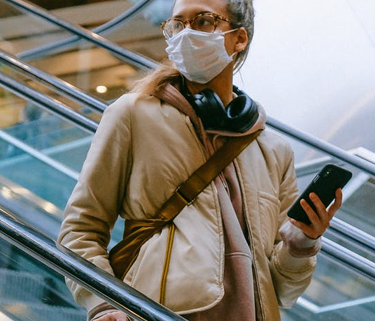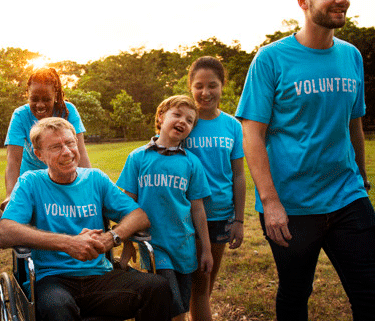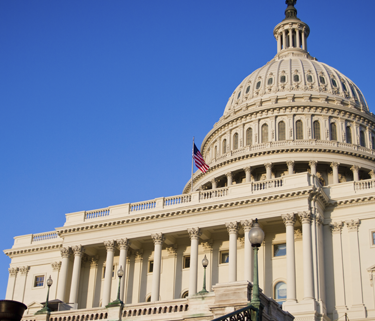Washington, D.C. – Following a meeting between leaders from disability rights organizations and CDC Director Rochelle Walensky, advocates released the following statement:
The dialogue with the CDC Director was long overdue. We should have never gotten to the point where the head of our nation’s leading public health agency finds it encouraging that a disproportionate number of COVID deaths are people with disabilities. The disability community’s coordinated organizing resulted in a number of actionable recommendations that were shared with Director Walensky Friday, including:
- Commit to regular ongoing meetings and consultation with disability stakeholders and CDC Leadership
- Ground isolation guidance in public health evidence and data and in an understanding of their impacts on those most at risk
- Take action to center people with disabilities—and other communities disproportionately impacted by COVID-19—by ensuring that all CDC COVID-19 guidance and other response efforts are inclusive of the needs of people with disabilities.
We are grateful for the opportunity to present these recommendations to the CDC, and we hope they and other federal agencies within HHS and beyond will work quickly to pursue them.
Bethany Lilly, Senior Director of Income Policy at The Arc of the United States, said “This was a good initial step for the CDC– listening and learning from disability advocates. But there are concrete policy steps that the CDC must take and we look forward to meeting with the CDC Director and other leadership to move these policies forward. We also know that the millions of people with disabilities across the U.S. want to hear from the Director as well.”
Maria Town, President and CEO of the American Association of People with Disabilities said, “The ableism that the disability community has experienced in our nation’s response to the COVID-19 pandemic is not unique nor exclusive to the CDC. It is pervasive in the field of public health and in the medical field. I hope state public health agencies and other healthcare entities are closely following our advocacy so that they center the disability community in their responses to the current emergency and future pandemics.”
Julia Bascom, Executive Director for the Autistic Self Advocacy Network, said “We hope that the CDC will use this moment to begin to rebuild trust with the disability community. This must include both a genuine public apology as well as sustained policy change, beginning with the list of detailed recommendations we provided. We look forward to partnering with the CDC on concrete actions to safeguard and support people with disabilities and transform how the agency approaches its work.”
Elena Hung, Executive Director and Co-founder of Little Lobbyists, said “We appreciate CDC Director Dr. Walensky responding to our request to meet with disability leaders to acknowledge the harm her recent statement and the CDC’s policies caused our community throughout the duration of the COVID-19 pandemic. We anticipate immediate action to address the concerns raised and we look forward to ongoing meetings with CDC leadership to rebuild trust with the disability community. Little Lobbyists will continue the work to hold our leaders accountable and ensure our children with complex medical needs and disabilities are part of every decision that impacts them.”
Susan Henderson, Executive Director at the Disability Rights Education & Defense Fund, said “We will be engaging with other agencies within the Department of Health and Human Services, as well as Congress, to make sure that the entrenched ableism that has led to systemic discrimination on the basis of disability, and has cost hundreds of thousands of disabled people their lives during this pandemic, does not happen again. We hope that, working with Dr. Walensky, the CDC leads by example.”
Matthew Cortland, Senior Fellow, Data for Progress, said, “Tens of millions of chronically ill, disabled, and immunocompromised Americans need not just the CDC but the entire federal government, led by the Biden White House, to swiftly implement substantive policies that actually value our lives. Today’s meeting was only the very first step on the Biden Administration’s path to rebuilding trust with the disability community.
I look forward to the CDC and the entire Biden Administration partnering with the disability community to develop a pandemic response that meaningfully safeguards the lives of tens of millions of chronically ill, disabled, and immunocompromised Americans.”
Jamila Headley, Co-Executive Director of Be A Hero said: “Today we called on the Director of the Centers for Disease Control to do two critical things: to put people with disabilities at the very center of the COVID-19 response, and to ground her agency’s interventions and guidance firmly in the evidence of what will best work to keep all of us safe.
Headley continued, “In the richest country in the world, the agencies in charge of our pandemic response should not be grounding our public health recommendations and interventions in an acceptance that COVID-19 tests and high quality masks are (and will remain) too scarce. Instead, they should ground their approach in evidence of what is most effective, and in the deep knowledge of the communities who are suffering the most at the hands of COVID-19. At this moment people living with disabilities and their loved ones should know that our government is doing everything they can to keep us safe and alive.”
“Even in the middle of the largest global pandemic in a century, this country can afford to ensure that all of us—including the 93 million people in America living with disabilities and the growing numbers of people joining our community—thrive. We will keep fighting until they do just that.”
“Today Dr. Walenksy apologized to disability rights leaders for her hurtful words last weekend, and said that she and her agency needed to do better. I agree and tomorrow, I expect her to begin taking action,” said Headley.
Background & Readout
The meeting took place following comments from Walensky on Good Morning America last Friday, January 7 about a study she found “encouraging,” in which deaths among vaccinated people were mostly isolated to those who have four or more comorbidities. The comment, for which Walensky apologized in the meeting, sparked outrage from the disability community. The hashtag #MyDisabledLifeIsWorthy, started by writer and advocate Imani Barbarin, was a top trend on Twitter last weekend. The frustration extends far beyond Walensky’s initial comment and reflects a greater need for government and society to center disabled and at-risk individuals in managing COVID. In recognition of the growing frustration of the disability community, groups requested a meeting with Walensky.
During the meeting, representatives sought to hold Director Walensky accountable for her comments, establish a working relationship with the CDC, and have a detailed discussion with Director Walenksy about policies the agency should adopt and implement to prioritize the health and safety of the disability community. During the meeting, Director Walensky apologized for her comments, and stated it was not her intent to be harmful to the community. Advocates acknowledged her apology, and also stressed the need for a public apology, as disabled and medically complex Americans who were not in this meeting also deserve to hear from Walensky. Director Walenksy also committed to regular meetings with involvement from senior officials and herself going forward.
The following organizations and individual advocates were in attendance: The American Association of People with Disabilities (AAPD), The Arc of the United States, The Autistic Self Advocacy Network (ASAN), Be A Hero, The Disability Justice Initiative at the Center for American Progress, Disability Rights Education & Defense Fund (DREDF), the Epilepsy Foundation, Little Lobbyists, and Matthew Cortland, Senior Fellow, Data for Progress.
The Arc advocates for and serves people with intellectual and developmental disabilities (IDD), including Down syndrome, autism, Fetal Alcohol Spectrum Disorders, cerebral palsy and other diagnoses. The Arc has a network of nearly 600 chapters across the country promoting and protecting the human rights of people with IDD and actively supporting their full inclusion and participation in the community throughout their lifetimes and without regard to diagnosis.
Editor’s Note: The Arc is not an acronym; always refer to us as The Arc, not The ARC and never ARC. The Arc should be considered as a title or a phrase.













